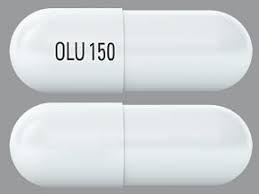Olutasidenib Side Effects
Medically reviewed by Drugs.com. Last updated on Apr 10, 2023.
Applies to olutasidenib: oral capsule.
Warning
Oral route (Capsule)
Warning: Differentiation SyndromeDifferentiation syndrome, which can be fatal, can occur with olutasidenib treatment. Symptoms may include dyspnea, pulmonary infiltrates/pleuropericardial effusion, kidney injury, hypotension, fever, and weight gain.If differentiation syndrome is suspected, withhold olutasidenib and initiate treatment with corticosteroids and hemodynamic monitoring until symptom resolution
Serious side effects of Olutasidenib
Along with its needed effects, olutasidenib may cause some unwanted effects. Although not all of these side effects may occur, if they do occur they may need medical attention.
Check with your doctor immediately if any of the following side effects occur while taking olutasidenib:
More common
- Agitation
- bloody stools
- blue lips, fingernails, or skin
- blurred vision
- chest pain or tightness
- chills
- coma
- confusion
- cough
- decreased urine output
- depression
- dizziness
- eye pain
- fever
- general feeling of illness
- headache
- hostility
- irregular, fast or slow, or shallow breathing
- irritability
- lethargy
- muscle twitching
- nausea
- pounding in the ears
- rapid weight gain
- rectal bleeding
- seizures
- slow or fast heartbeat
- sore throat
- stomach pain or tenderness
- stupor
- swelling of the face, ankles, or hands
- trouble breathing
- unusual tiredness or weakness
Incidence not known
- Dark urine
- loss of appetite
- stomach pain, sever
- vomiting
- yellow eyes or skin
Other side effects of Olutasidenib
Some side effects of olutasidenib may occur that usually do not need medical attention. These side effects may go away during treatment as your body adjusts to the medicine. Also, your health care professional may be able to tell you about ways to prevent or reduce some of these side effects.
Check with your health care professional if any of the following side effects continue or are bothersome or if you have any questions about them:
More common
- Bleeding gums
- body aches or pain
- bone pain
- constipation
- diarrhea
- difficulty in moving
- hoarseness
- irritation in the mouth
- joint pain
- mouth ulcers
- muscle pain or stiffness
- pain in the arms or legs
- redness and swelling of the gums
- stuffy or runny nose
- tender, swollen glands in the neck
- trouble in swallowing
- voice changes
For Healthcare Professionals
Applies to olutasidenib: oral capsule.
Cardiovascular
Frequency not reported: Electrocardiogram QT prolongation[Ref]
Dermatologic
Very common (10% or more): Rash (24%)[Ref]
Gastrointestinal
Very common (10% or more): Abdominal pain (18%), constipation (26%), diarrhea (20%), mucositis (23%), nausea (38%), vomiting (17%)[Ref]
General
-The most common (20% or greater frequency) adverse reactions, including laboratory abnormalities, were aspartate aminotransferase increased, alanine aminotransferase increased, potassium decreased, sodium decreased, alkaline phosphatase increased, nausea, creatinine increased, fatigue/malaise, arthralgia, constipation, lymphocytes increased, bilirubin increased, leukocytosis, uric acid increased, dyspnea, pyrexia, rash, lipase increased, mucositis, diarrhea and transaminitis.
-Serious adverse reactions were reported in 25% of patients which included differentiation syndrome (9%) and transaminitis (6%).
-Adverse reactions that led to permanent discontinuation of this drug were reported in 8% of patients which included transaminitis, differentiation syndrome, and gallbladder disorders.[Ref]
Hematologic
Very common (10% or more): Differentiation syndrome (16%), hypertension (10%), leukocytosis (25%)[Ref]
Hepatic
Very common (10% or more): Transaminitis (20%)
Frequency not reported: Biliary tract disorder, biliary colic, cholangitis, and cholestasis[Ref]
Metabolic
Very common (10% or more): Decreased appetite (16%)[Ref]
Musculoskeletal
Very common (10% or more): Arthralgia (28%)[Ref]
Nervous system
Very common (10% or more): Headache (13%)[Ref]
Other
Very common (10% or more): Edema (18%), fatigue/malaise (36%), pyrexia (24%)[Ref]
Respiratory
Very common (10% or more): Cough (17%), dyspnea (24%)[Ref]
More about olutasidenib
- Check interactions
- Compare alternatives
- Dosage information
- During pregnancy
- Drug class: miscellaneous antineoplastics
- Breastfeeding
- En español
Patient resources
Other brands
Professional resources
Other brands
Related treatment guides
References
1. Product Information. Rezlidhia (olutasidenib). Rigel Pharmaceuticals. 2022.
Further information
Always consult your healthcare provider to ensure the information displayed on this page applies to your personal circumstances.
Some side effects may not be reported. You may report them to the FDA.

